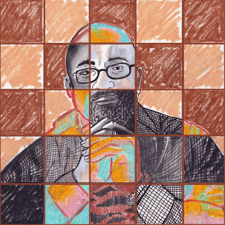An Enigmatic Life
Glenn Loury’s new memoir raises a big question.
By Edmund N. Santurri
Illustration by Janelle Delia (used with permission).
Glenn Loury’s new memoir, Late Admissions: Confessions of a Black Conservative, is a curious amalgam — part apologia pro vita sua of a famous black conservative, part argument about race, social theory and economics, part noir account of a man torn by desire for conventional success competing with lurid underground obsession and addiction, part postmodern rhetorical strategy teasing the reader to ask what’s going on finally.
Loury’s autobiography has been celebrated in some quarters as a relentlessly truthful narrative, courageous for its self-denigrating honesty. This reader is left wondering. Is that the point, to leave us wondering?
Full disclosure: I’ve known the author a bit for a few years. In 2019, I interviewed him as a guest of the institute I directed, and he interviewed me in 2022 on “The Glenn Show” shortly after I ended my term as director. In these settings and in his previous writings he has impressed me as a candid, judicious, nuanced, eloquent, engaging, fair-minded, tough-minded and, yes, brave commentator on a range of social problems — particularly those related to race. Loury has challenged what are for many African-Americans sacred commitments (affirmative action, reparations) and has signaled allegiance to notions some on the left regard as outdated and retrograde (colorblindness). He has also acknowledged his struggles with these issues, right-left-right oscillations in his thinking, worries about serving or being cast as a pawn for reactionary agents of racial injustice. The memoir recounts much of this in rich detail. Moreover, before reading the memoir, I’d read some here and there about his battles with personal demons, so I wasn’t entirely surprised to encounter reports of his existential grappling in the autobiography itself. But I have to admit that I was not quite prepared for the depth, pervasiveness and sheer persistence of the corruptions and pathologies confessed.
To be sure, Loury does try to prepare the reader in the preface of Late Admissions. The memoirist wants to be believed, he avers, but the reader is bound to be suspicious. After all, every memoir is an apologia in some measure. The author wants to defend his life and will take liberties with the facts or at least shape them tendentiously to make the case.
How to convince the reader that this is the truth at least largely unvarnished? Here’s an idea. Confess to some things so shameful that the only reason for admitting them must be the fact that they are true. Then the author’s general credibility is established for reporting the good things about himself as well as the bad.
Behind these overt scenes of conventional success is a man given indefatigably to rebarbative behavior.
So, Loury announces, “I am going to tell you things about myself that no one would want anybody to think was true of them. And yet, they are true…. I must tell it all in this memoir, because if I don’t tell it all, nothing I say will be heard” (p. ix). And the revelations come.
Here is the life of a prominent economist and social theorist, celebrated author, scholar and commentator, variously positioned at distinguished universities — Northwestern, Michigan, Harvard, Princeton, MIT, Boston, Brown; yet behind these overt scenes of conventional success is a man given indefatigably to rebarbative behavior — serial lying, compulsive and reiterative sexual infidelity, callous treatment and betrayal of lovers, friends and supporters, neglect and abandonment of children, substance abuse and addiction, nighttime cruising in “slightly sketchy neighborhoods” (p. 188) and “cities with rough edges” (p. 194) in search of sex, drugs, and excitement, occasionally reveling in a paradoxical self-conception — eminent public intellectual proving himself sub rosa as gangsta or “Player” — in Loury’s terms, “someone whose mastery over whatever game is at hand commands the respect and admiration of others” (p. 20).
At certain moments the memoir reads as a “coming-of-age” novel. An intellectually gifted black male — born and raised by divorced, struggling, working-class parents on the south side of Chicago — lives, stumbles, learns, and matures into a high-powered, controversial thinker. Other times we’re given intellectual history, Loury’s recounting of his own ideas largely as heterodox counterpoints to dominant liberal black orthodoxies articulated over the past half century.
Still other times we encounter empirically and mathematically grounded moral argument — Loury’s defense of his social vision settled after years of testing and revision. Among that vision’s central claims: Affirmative action has outlived whatever usefulness it has had since the fundamental racial problems it was meant to solve remain. Those problems are as much the consequence of culture and family breakdown in the African-American community as they are the result of past discrimination or “systemic racism.” What is needed for racial progress is the development of “social capital” in that community, the web of human relations, including family, that makes for substantive equal opportunity and overall social success. Such development requires both investment of public resources and cultural change within the black community, change that fosters a new sense of moral responsibility and a movement away from attitudes of dependency and entitlement. In this account, calls for “reparations” simpliciter are misguided since one-time payoffs are merely symbolic, don’t resolve the central problem, may give the impression that society has paid its debt without remainder for past discrimination and thus may undermine social incentives to invest in policies that generate real progress.
Augustine might have said, “Oh Lord, give me continence, but not yet.”
Some of these claims mark Loury’s standing as black “conservative,” and he does appreciate the efficiencies of the free market. But he’s no libertarian or laissez-faire capitalist as indicated by his proposals for state-induced wealth transfers to achieve social justice. It would go too far to say that Loury is or ever was a Rawlsian liberal, but sometimes he sounds like one.
Again, in the memoir all this theorizing life of the mind comes off as a kind of loose apollonian cover on a cauldron containing dionysian energies that find their outlets with a high degree of frequency. Loury sins again and again. There are intermittent qualms of conscience, feelings of regret, remorse, shame, chagrin. But these have little staying power. Augustine might have said, “Oh Lord, give me continence, but not yet.” The lapses are often embraced and recounted blithely with little apparent recollection of or learning from previous regrets.
Then there are two crucial moments of public shaming. Loury is arrested twice, the first time for assault of a paramour (the charge is denied and eventually dropped), the second time for narcotics possession. His reputation is seriously damaged. When he hits a sloughy despond, he enters drug rehab and provisionally gets Christian religion of the charismatic African Methodist Episcopal and Charles Colson evangelical varieties. Lost soul dying and rising with Christ.
But finally there’s too much critical Enlightenment thinker in Loury to live with glossolalia or resurrection, and the religion fails to stick. His life and career go on. Tragically he loses his second wife, Linda, to cancer; there is some rapprochement with his children; he meets and marries his third wife, LaJuan; the Glenn Show launches and succeeds with regular interlocutor John McWhorter permanently on board. Together they offer a Black counterpoint critique of the George Floyd “riots” and “the Black Lives Matter party line.” Loury continues at Brown University as “Merton P. Stolz Professor of the Social Sciences.”
But has it all been a game for Loury, not just the cruising for sex, drugs and excitement or the recidivist personal betrayals and manipulations, but also the career, the accomplishments, the social theorizing about race and society, the life? Has he been a “Player” in all these domains? Indeed, qua memoirist, has he been playing the reader, the “mark” of the game? Or is he playing the game with himself as “mark,” the game of self-deception?
To his credit, these are Loury’s own questions, posed quite explicitly in the “Conclusion” of Late Admissions — and he answers definitively none of them, other than to assert in the book’s very last sentence that “the game never ends.” So we’re left wondering ourselves: Have we (and he) been had?
